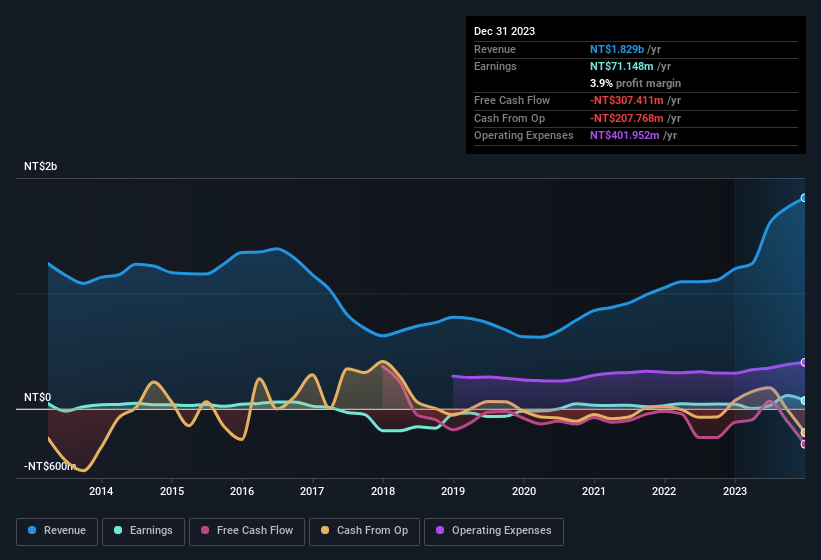- Taiwan
- /
- Communications
- /
- TWSE:3027
We Think That There Are Issues Underlying Billion Electric's (TWSE:3027) Earnings
Billion Electric Co., Ltd. (TWSE:3027) announced strong profits, but the stock was stagnant. Our analysis suggests that shareholders have noticed something concerning in the numbers.
View our latest analysis for Billion Electric

Zooming In On Billion Electric's Earnings
As finance nerds would already know, the accrual ratio from cashflow is a key measure for assessing how well a company's free cash flow (FCF) matches its profit. To get the accrual ratio we first subtract FCF from profit for a period, and then divide that number by the average operating assets for the period. The ratio shows us how much a company's profit exceeds its FCF.
That means a negative accrual ratio is a good thing, because it shows that the company is bringing in more free cash flow than its profit would suggest. That is not intended to imply we should worry about a positive accrual ratio, but it's worth noting where the accrual ratio is rather high. Notably, there is some academic evidence that suggests that a high accrual ratio is a bad sign for near-term profits, generally speaking.
Over the twelve months to December 2023, Billion Electric recorded an accrual ratio of 0.24. Therefore, we know that it's free cashflow was significantly lower than its statutory profit, which is hardly a good thing. Over the last year it actually had negative free cash flow of NT$307m, in contrast to the aforementioned profit of NT$71.1m. Coming off the back of negative free cash flow last year, we imagine some shareholders might wonder if its cash burn of NT$307m, this year, indicates high risk. Unfortunately for shareholders, the company has also been issuing new shares, diluting their share of future earnings.
Note: we always recommend investors check balance sheet strength. Click here to be taken to our balance sheet analysis of Billion Electric.
One essential aspect of assessing earnings quality is to look at how much a company is diluting shareholders. Billion Electric expanded the number of shares on issue by 16% over the last year. As a result, its net income is now split between a greater number of shares. Per share metrics like EPS help us understand how much actual shareholders are benefitting from the company's profits, while the net income level gives us a better view of the company's absolute size. You can see a chart of Billion Electric's EPS by clicking here.
How Is Dilution Impacting Billion Electric's Earnings Per Share (EPS)?
As you can see above, Billion Electric has been growing its net income over the last few years, with an annualized gain of 128% over three years. But EPS was only up 103% per year, in the exact same period. And the 78% profit boost in the last year certainly seems impressive at first glance. But in comparison, EPS only increased by 57% over the same period. Therefore, the dilution is having a noteworthy influence on shareholder returns.
Changes in the share price do tend to reflect changes in earnings per share, in the long run. So Billion Electric shareholders will want to see that EPS figure continue to increase. However, if its profit increases while its earnings per share stay flat (or even fall) then shareholders might not see much benefit. For that reason, you could say that EPS is more important that net income in the long run, assuming the goal is to assess whether a company's share price might grow.
Our Take On Billion Electric's Profit Performance
As it turns out, Billion Electric couldn't match its profit with cashflow and its dilution means that earnings per share growth is lagging net income growth. For the reasons mentioned above, we think that a perfunctory glance at Billion Electric's statutory profits might make it look better than it really is on an underlying level. If you'd like to know more about Billion Electric as a business, it's important to be aware of any risks it's facing. Be aware that Billion Electric is showing 2 warning signs in our investment analysis and 1 of those shouldn't be ignored...
Our examination of Billion Electric has focussed on certain factors that can make its earnings look better than they are. And, on that basis, we are somewhat skeptical. But there are plenty of other ways to inform your opinion of a company. Some people consider a high return on equity to be a good sign of a quality business. So you may wish to see this free collection of companies boasting high return on equity, or this list of stocks that insiders are buying.
Valuation is complex, but we're here to simplify it.
Discover if Billion Electric might be undervalued or overvalued with our detailed analysis, featuring fair value estimates, potential risks, dividends, insider trades, and its financial condition.
Access Free AnalysisHave feedback on this article? Concerned about the content? Get in touch with us directly. Alternatively, email editorial-team (at) simplywallst.com.
This article by Simply Wall St is general in nature. We provide commentary based on historical data and analyst forecasts only using an unbiased methodology and our articles are not intended to be financial advice. It does not constitute a recommendation to buy or sell any stock, and does not take account of your objectives, or your financial situation. We aim to bring you long-term focused analysis driven by fundamental data. Note that our analysis may not factor in the latest price-sensitive company announcements or qualitative material. Simply Wall St has no position in any stocks mentioned.
About TWSE:3027
Billion Electric
Engages in networking and communication, and power and energy management businesses in Taiwan, the United States, Asia, Europe, Oceania, and Africa.
Flawless balance sheet and good value.
Market Insights
Community Narratives



